MICROSOFT OFFICIAL: New Updated 70-410 Exam Questions from Braindump2go 70-410 pdf dumps and 70-410 vce dumps! Welcome to download the newest Braindump2go 70-410 vce&pdf dumps: http://www.braindump2go.com/70-410.html (471 Q&As)
70-410 Exam Questions are updated recently by Microsoft Official! Braindump2go has already got all the latest 70-410 Exam Questions and provides latest 70-410 Dumps for free download Now!70-410 PDF and 70-410 VCE are available for download now! You can get the latest updated 70-410 Practice Tests and 70-410 Practice Exams! Pass 70-410 Certification Exam Now!
Exam Code: 70-410
Exam Name Installing and Configuring Windows Server 2012
Certification Provider: Microsoft
Corresponding Certifications: MCSA, MCSA: Windows Server 2012, MCSE, MCSE: Desktop Infrastructure, MCSE: Private Cloud, MCSE: Server Infrastructure
Keywords:70-410 Dumps,70-410 Exam Questions,70-410 VCE,70-410 VCE Free,70-410 PDF,70-410 Lab Manual PDF,70-410 Practice Exams,70-410 Practice Tests,70-410 Installing and Configuring Windows Server 2012

QUESTION 421
Hotspot Question
Your network contains an Active Directory domain named contoso.com.
The domain contains 25 servers. All servers run Windows Server 2012 R2.
You need to create a Windows Firewall rule to prevent administrators from using Internet Explorer to access the Internet while they are logged on interactively to the servers.
The solution must not prevent administrators from accessing websites on the internal network.
How should you configure the rule? To answer, select the appropriate options in the answer area.
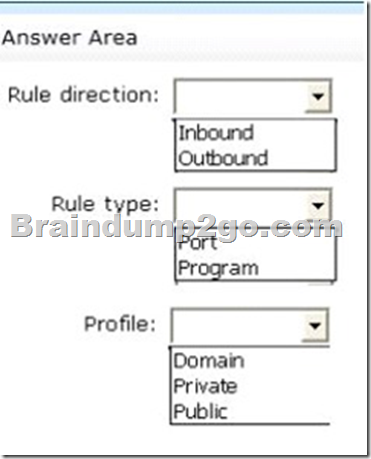
Answer:
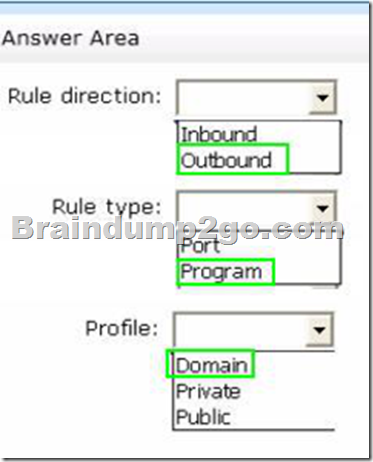
QUESTION 422
Your network contains a server named Server1 and 10 Web servers.
All servers run Windows Server 2012 R2.
You create a Windows PowerShell Desired State Configuration (DSC) to push the settings from Server1 to all of the Web servers.
On Server1, you modify the file set for the Web servers.
You need to ensure that all of the Web servers have the latest configurations.
Which cmdlet should you run on Server1?
A. Restore-DcsConfiguration
B. Set DcsLocalConfigurationManager
C. Start-DcsConfiguration
D. Get-DcsConfiguration
Answer: C
QUESTION 423
Hotspot Question
Your network contains an Active Directory domain named fabrikam.com.
You implement DirectAccess and an IKEv2 VPN.
You need to view the properties of the VPN connection.
Which connection properties should you view? To answer, select the appropriate connection properties in the answer area.
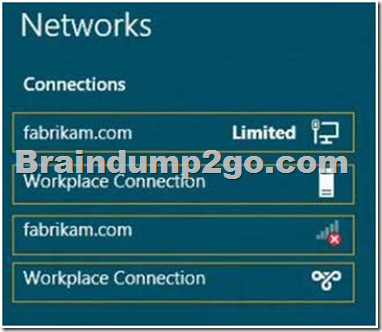
Answer:
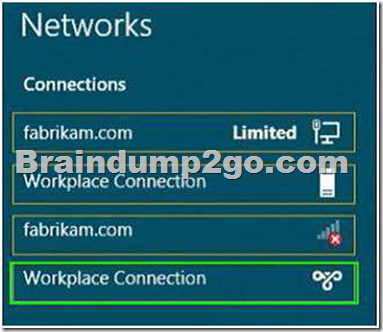
QUESTION 424
Your network contains an Active Directory domain named contoso.com.
The domain contains servers named Server1 and Server2 that run Windows Server 2012 R2. Server1 has the Active Directory Federation Services server role installed.
Server2 is a file server. Your company introduces a Bring Your Own Device (BYOD) policy.
You need to ensure that users can use a personal device to access domain resources by using Single Sign-On (SSO) while they are connected to the internal network.
Which two actions should you perform? (Each correct answer presents part of the solution. Choose two.)
A. Enable the Device Registration Service in Active Directory.
B. Publish the Device Registration Service by using a Web Application Proxy.
C. Configure Active Directory Federation Services (AD FS) for the Device Registration Service.
D. Install the Work Folders role service on Server2.
E. Create and configure a sync share on Server2.
Answer: AC
Explanation:
*Prepare your Active Directory forest to support devices This is a one-time operation that you must run to prepare your Active Directory forest to support devices.
To prepare the Active Directory forest
On your federation server, open a Windows PowerShell command window and type:
Initialize-ADDeviceRegistration
*Enable Device Registration Service on a federation server farm node To enable Device Registration Service
1.On your federation server, open a Windows PowerShell command window and type:
Enable-AdfsDeviceRegistration
2.Repeat this step on each federation farm node in your AD FS farm.
QUESTION 425
Your network contains an Active Directory domain named contoso.com. The domain contains a server named Server1.Server1 runs Windows Server 2012 R2 and has the Hyper-V server role installed.
On Server1, you create and start a virtual machine named VM1.VM1 is configured as shown in the following table.
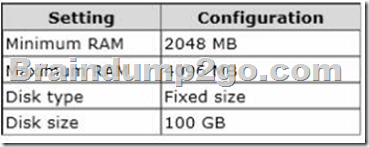
You need to recommend a solution to minimize the amount of disk space used for the checkpoint of VM1.
What should you do before you create the checkpoint?
A. Run the Resize-VHD cmdlet.
B. Convert Disk1.vhd to a dynamically expanding disk.
C. Shut down VM1.
D. Run the Convert-VHD cmdlet.
Answer: C
QUESTION 426
Your network contains a Hyper-V host named Server1 that runs Windows Server 2012 R2.
Server1 hosts a virtual machine named VM1 that runs Windows Server 2012 R2.
You take a snapshot of VM1, and then you install an application on VM1.
You verify that the application runs properly.
You need to ensure that the current state of VM1 is contained in a single virtual hard disk file.
The solution must minimize the amount of downtime on VM1.
What should you do?
A. From Hyper-V Manager, delete the snapshot.
B. From a command prompt, run dism.exe and specify the /commit-image parameter.
C. From a command prompt, run dism.exe and specify the /delete-image parameter.
D. From Hyper-V Manager, inspect the virtual hard disk.
Answer: A
Explanation:
Virtual machine snapshots are file-based snapshots of the state, disk data, and configuration of a virtualmachine at a specific point in time.
You can take multiple snapshots of a virtual machine, even while it is running. You can then revert the virtual machine to any of the previous states by Applying a snapshot to the virtualmachine.
Taking a snapshot of a VM is to in essence freeze the current state and make it a parent disk based on currentstate, and at the same time create a child disk to capture all subsequent changes. – See more at:
Snapshots require adequate storage space. Snapshots are stored as .avhd files in the same location at thevirtual hard disk. Taking multiple snapshots can quickly consume a large amount of storage space.
When you use Hyper-V Manager to delete a snapshot, the snapshot is removed from the snapshot treebut the .avhd file is not deleted until you turn off the virtual machine.
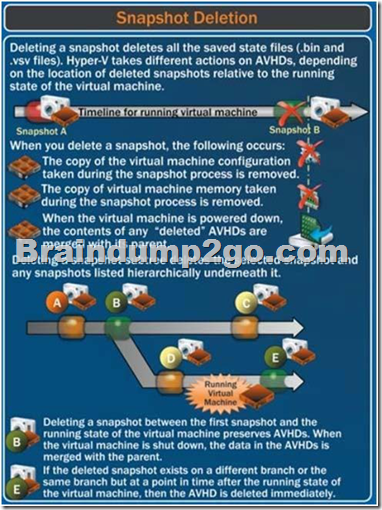
http://www.laneolson.ca/2009/10/09/hyper-v-snapshots-and-disk-space/ http://blogs.technet.com/b/yungchou/archive/2013/01/23/hyper-v-virtual-hard-disk-vhdoperations-explained.aspx
http://zoom.it/12u8
http://www.server-talk.eu/wp-content/uploads/article_2010-05-28_02.png http://blogs.msdn.com/b/virtual_pc_guy/archive/2009/04/15/what-happens-when-i-delete- asnapshot-hyper-v.aspx
http://blogs.technet.com/b/yungchou/archive/2013/01/23/hyper-v-virtual-hard-disk-vhd- operations-explained.aspx
http://blogs.technet.com/b/josebda/archive/2012/03/20/windows-server-8-beta-hyper-vover-smb- quickprovisioning-a-vm-on-an-smb-file-share.aspx
QUESTION 427
Your network contains an Active Directory domain named adatum.com.
The domain contains a server named Server1 that runs Windows Server 2012 R2.
On a server named Corel, you perform a Server Core Installation of Windows Server 2012 R2.You join Corel to the adatum.com domain.
You need to ensure that you can use Event Viewer on Server1 to view the event logs on Corel.
What should you do on Corel?
A. Run the Enable-NetFirewallRulecmdlet.
B. Run the Disable-NetFirewallRulecmdlet.
C. Install Windows Management Framework.
D. Install Remote Server Administration Tools (RSAT).
Answer: A
Explanation:
Information regarding IPsec policy changes, etc. can be found in the Event Viewer. Thus you need to enable the NetFirewallRule command. This will allow you to view the event logs.
QUESTION 428
Your network contains an Active Directory domain named contoso.com. The domain contains a server named Server1.Server1 runs Windows Server 2012 R2.
You need to create a 3-TB virtual hard disk (VHD) on Server1.
Which tool should you use?
A. New-StoragePool
B. Diskpart
C. File Server Resource Manager (FSRM)
D. New-StorageSubsytemVirtualDisk
Answer: B
Explanation:
You can create a VHD from either the Disk Management snap-in or the command line (diskpart).
From the DiskPart command-line tool at an elevated command prompt, run the create vdisk command and specify the file (to name the file) and maximum (to set the maximum size in megabytes) parameters. The following code demonstrates how to create a VHD file at
C:\vdisks\disk1.vdh with a maximum file size of 16 GB (or 16,000 MB).
DiskPart
Microsoft DiskPart version 6.1.7100
Copyright (C) 1999-2008 Microsoft Corporation.
On computer: WIN7
DISKPART> create vdisk file=”C:\vdisks\disk1.vhd” maximum=16000
QUESTION 429
Your network contains an Active Directory domain named contoso.com.
You create a software restriction policy to allow an application named App1 by using a certificate rule.
You need to ensure that when users attempt to execute App1, the certificate for App1 is verified against a certificate revocation list (CRL).
What should you do?
A. Modify the rule for App1.
B. Modify the Trusted Publishers Properties.
C. Create a new certificate rule for App1.
D. Modify the Enforcement Properties.
Answer: B
QUESTION 430
You perform a Server Core Installation of Windows Server 2012 R2 on a server named Server1.
You need to add a graphical user interface (GUI) to Server1.
Which tool should you use?
A. The Install-WindowsFeaturecmdlet
B. The Install-Module cmdlet
C. The Install-RoleServicecmdlet
D. The setup.exe command
Answer: A
Explanation:
The DISM command is called by the Add-WindowsFeature commanD. Here is the syntax for DISM:
Dism /online /enable-feature /featurename:ServerCore-FullServer /featurename:Server- Gui-Shell /featurename:Server-Gui-Mgmt
Braindump2go New Published Exam Dumps: Microsoft 70-410 Practice Tests Questions, 471 Latest Questions and Answers from Official Exam Centre Guarantee You a 100% Pass! Free Download Instantly!

70-410 PDF Dumps & 70-410 VCE Dumps Full Version Download(471q): http://www.braindump2go.com/70-410.html